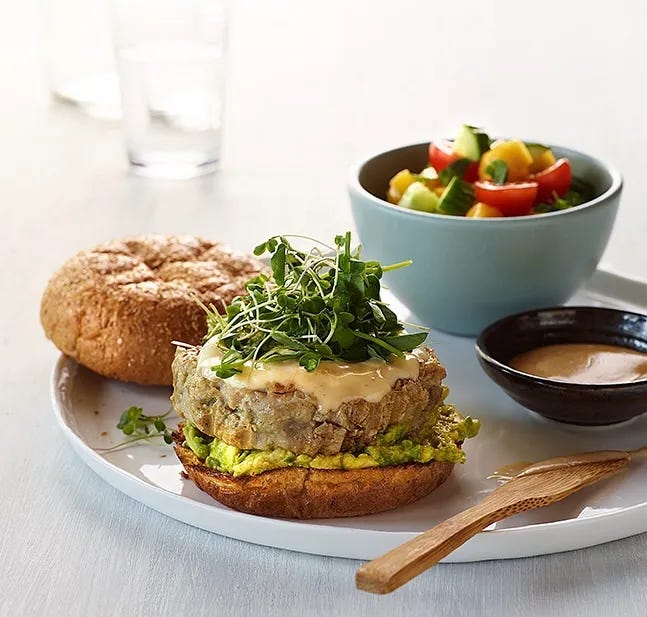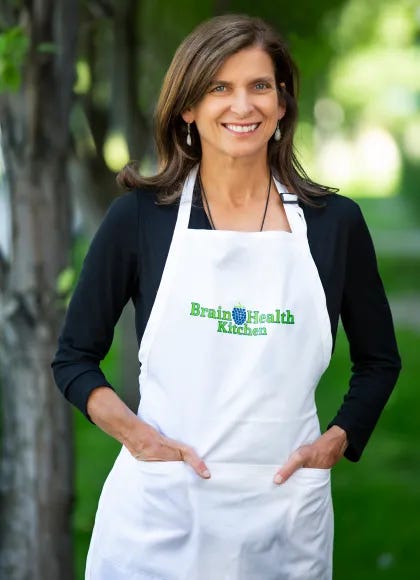Brain health is one of those things we don’t think about… until we have to. But the truth is, what we eat now matters later.
Dr. Annie Fenn is a chef, a doctor, and my go-to for all things brain food. She cuts through the noise and actually makes it make sense. This week, I asked her the questions I think of most often, from coffee and wine to memory, brain fog, and what to eat when you're stressed.
So you don’t have to.
Enjoy.
Q: What did you eat for breakfast?!
A: This Medi Omelet with a side of berries. It's stuffed with whatever veggies and greens I have on hand along with a sprinkle of feta. So good! Here's the recipe.
Q: What are five things in your fridge right now that support brain health?
A: Greek yogurt, raspberries, baby artichokes, capers, and a big box of arugula.
Q: Is wine actually good for your brain—or is that just what we tell ourselves? Is alcohol bad for the brain, even a few cocktails a week?
A: Doctors used to believe that moderate drinking was good for the heart and brain (moderate = 1 drink/day for women, 2 drinks/day for men). Now we have better studies. The truth is, the more one drinks, the more the brain shrinks. It’s better to not drink at all, but if you do, be a light drinker and keep it to no more than four drinks per week. Always enjoy alcohol with food and with others—never alone.
Q: What’s one food women over 50 should be eating every single day for memory and focus?
A: Berries! The Nurses’ Health Study followed over 16,000 women over age 60 for 12 years and found that those who ate at least ½ cup of berries twice a week had better memory and thinking skills. I recommend 1 cup a day. Frozen are just as good as fresh.
Q: Can you explain brain fog in one sentence—and how to fight it naturally?
A: When the brain runs low on glucose and nutrients, thinking slows and memory fails.
Here are 3 proven ways to fight it:
Prioritize 7–8 hours of sleep.
Eat whole foods with a low glycemic index to keep blood sugar stable (vegetables, whole grains, greens, berries, nuts, beans, and legumes).
Eat flavonoid-rich foods throughout the day for memory and executive function. Good choices include berries, green tea, apples, colorful vegetables, nuts, and seeds.
Q: What do you eat when you're stressed but still want to stay sharp?
A: A medjool date smeared with almond butter. And I’ll sip a cup of green tea.
Q: Is coffee helping or hurting our brains? Be honest.
A: Coffee is extremely good for brain health. Daily coffee drinkers are 30 to 37% less likely to develop dementia than non-coffee drinkers.
But there are caveats:
Skip the decaf. Caffeinated coffee protects the brain; decaf hasn’t shown the same benefit.
Hold the sweeteners. Sugar and non-nutritive sweeteners cancel out the benefits.
Skip the milk and cream. Dairy protein binds to the brain-healthy polyphenols in coffee, reducing its protective effect.
Brew it right. Use a paper filter (like drip or pour-over). Unfiltered coffee (French press, pods, boiled coffee) contains compounds that raise bad cholesterol. Espresso is in the middle.
Bottom line: For brain health, drink filtered, caffeinated, black, unsweetened coffee.
Q: If you could only cook with three brain-boosting ingredients, what would they be?
A:
Extra-virgin olive oil. It’s rich in brain-healthy polyphenols. Quality matters—I'm importing a small batch from Tuscany. Want me to send you some?
Vegetables. A variety is key. I love cruciferous (broccoli, cabbage, cauliflower, kale), colorful (beets, carrots, radishes), and mushrooms (studies show eating mushrooms twice a week helps prevent dementia).
Fish and seafood. They provide DHA and EPA, essential for repairing brain cells and reducing inflammation. Even with concerns about microplastics, fish is still a win for brain health and essential protein as we age.
Q: What’s your go-to indulgence that’s secretly good for your brain—or at least not terrible?
A: Dark chocolate. I eat a generous square every day. The darker the better—aim for 65% cacao or higher to get the brain-boosting flavonoids.
Q: What’s one food you thought was healthy but actually isn’t great for brain health?
A: A blueberry muffin from the coffee shop. Most are full of sugar and saturated fat. But I love making healthier versions at home.
Q: What’s one small habit you’ve added to your day that made a big difference for your brain?
A: I don’t look at my phone for the first hour of the day. Instead, I sip coffee, spend time with my husband, and snuggle with my dogs. It helps my brain start calm and focused. I do a lot of research, writing, and recipe testing—so I need my brain firing on all cylinders.
Q: I don't like large pills. Are any of the squeeze oils or gummies or bottle oils good? Can you give us your best brands?
A: The marine-based omega-3s are so crucial for brain health, and I recommend both eating fish and taking fish oil supplements. Look for DHA and EPA in a 3:1 ratio, bound to phosphatidyl choline (not an ester base) for best absorption to the brain.
My top brand is also a brain multivitamin, which provides other key brain health nutrients including B complex vitamins, vitamin D, choline, lutein, and flavonoids: Relevate by NeuroReserve. If you would like to try Relevate, use my discount code ANNIEBHK for 15% off.
I don't like big pills either, but I find Relevate easy to swallow with a very large gulp of water! Also, taking fish oil with food is best for absorption of many of the nutrients so I take mine after breakfast. If you can't swallow a pill, you can get your omega-3s in a cod liver oil like this one from Nordic Naturals.











Bobbi! This was such fun. I am dreaming of a Substack collab where you come over for breakfast and I make you coffee and a Medi omelet and you share your famous make-up tips. With Substack, dreams really do come true! (I live in Jackson Hole, stop by anytime.) xoxo
I love reading advice like this! I get confirmation on the things I’m doing right and I need the reminders on things I know but forget to incorporate in my daily life. I love that the coffee I drink not only helps my liver, but now I’m happy it helps my brain too! I’m 13 years post liver transplant and that propelled an early study on healthy habits that I incorporated in my life. Thank you!